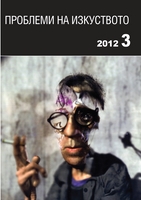Тропикалистко-канибалистки аспекти в бразилското „синема ново"
Cannibal-tropicalist Aspects in Brazilian Cinema Novo
Author(s): Boryana MateevaSubject(s): Theatre, Dance, Performing Arts
Published by: Институт за изследване на изкуствата, Българска академия на науките
Summary/Abstract: The article follows the artistic interrelatedness between Brazilian modernism of the 1920s and the Tropicalist Movement of the late 1960s, the development of the ideas and their metamorphosis in response to the changing political situation. Tropicalism is a cultural movement in pop music, cinema, theatre, visual arts and literature. It sprang from the contradiction between the anachronisms of social life and the advancing of modern economy. The result was an allegorical vision of Brazil, which exploited grotesque, bad taste, kitsch. Tropicalists played mockingly with the myth of Brazil as a tropical paradise. Tropicalism is related to modernism through the term ‘cannibalism’. After several emblematic manifestos released in the period 1922–1 930, Brazilian modernists united in the Cannibalistic Movement. Cannibalism, carried out by native people in the past, was raised to a strong metaphor of creativity: an authentic national culture is created through absorbing foreign influences. Imported ideas had to be digested and processed like a raw material for yet another synthesis, which had to go up against colonizers and neo-colonial mentality with radical ‘cultural nationalism’. The film Macunaíma (1969) directed by Joaquim Pedro de Andrade, is analysed, which is believed to be the peak of the third phase of Cinema Novo, called by the reviewers ‘tropical-cannibalist’. Other significant titles are also mentioned. The unique contribution of Tropicalism is noted as a cultural bridge a kind of a ‘frontier situation’ where ideas of modernism meet, interact and merge into the practices of postmodernism.
Journal: Проблеми на изкуството
- Issue Year: 2012
- Issue No: 3
- Page Range: 26-29
- Page Count: 4
- Language: Bulgarian
- Content File-PDF

